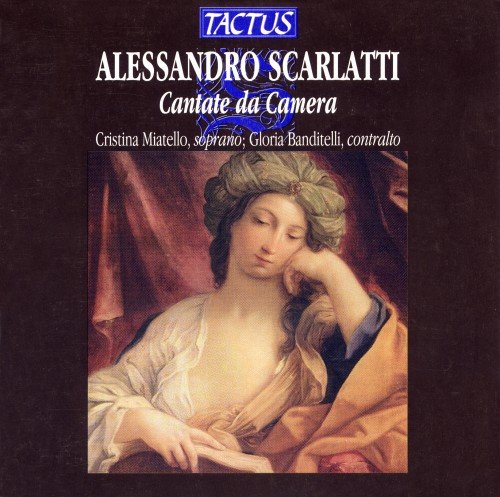
Gloria Banditelli, Enrico Gatti, Ensemble Aurora - Scarlatti: Cantate da camera (1999)
BAND/ARTIST: Gloria Banditelli, Enrico Gatti, Ensemble Aurora
- Title: Scarlatti: Cantate da camera
- Year Of Release: 1999
- Label: Tactus
- Genre: Classical, Vocal
- Quality: FLAC (image+.cue,log,scans)
- Total Time: 01:08:53
- Total Size: 369 Mb
- WebSite: Album Preview
Tracklist:
1. Andate, o miei sospiri, chamber cantata for soprano & continuo No. 1 in G minor 12:50
2. Per un momento solo, chamber cantata for soprano or alto & continuo ("Lo sfortunato") 10:12
3. Lascia più di tormentarmi amor tiranno, chamber cantata for soprano & continuo 5:51
4. Lontan da la sua Clori, chamber cantata for soprano & continuo 11:08
5. Bella madre dei fiori, chamber cantata for soprano, 2 violins & continuo (doubtful) 28:51
Performers:
Christina Miatello (soprano)
Guido Morini (clavicembalo)
Andrea Fossá (violoncello)
Gloria Banditelli (contralto)
Ensemble Aurora:
Enrico Gatti & Luigi Mangiocavallo (violini)
Roberto Gini (violoncello)
Luciano Còntini (arciliuto)
Guido Morini (clavicembalo)
1. Andate, o miei sospiri, chamber cantata for soprano & continuo No. 1 in G minor 12:50
2. Per un momento solo, chamber cantata for soprano or alto & continuo ("Lo sfortunato") 10:12
3. Lascia più di tormentarmi amor tiranno, chamber cantata for soprano & continuo 5:51
4. Lontan da la sua Clori, chamber cantata for soprano & continuo 11:08
5. Bella madre dei fiori, chamber cantata for soprano, 2 violins & continuo (doubtful) 28:51
Performers:
Christina Miatello (soprano)
Guido Morini (clavicembalo)
Andrea Fossá (violoncello)
Gloria Banditelli (contralto)
Ensemble Aurora:
Enrico Gatti & Luigi Mangiocavallo (violini)
Roberto Gini (violoncello)
Luciano Còntini (arciliuto)
Guido Morini (clavicembalo)
Alessandro Scarlatti was born in Palermo on 2 May 1660. In 1678 he married Antonia Anzalone by whom he had ten children, including the great Domenico. When still quite young, Scarlatti made himself known in Roman musical circles through his pastoral fable Gli equivoci del sembiante performed in 1679. In addition to writing operas, Scarlatti tried his hand at the cantata - one of the musical genres preferred by the nobility of the time - and sacred music. The writing of sacred compositions became a professional obligation following the composer's appointment as maestro di cappella at the church of S. Gerolamo della Carità. The war of succession to the Spanish throne convinced Scarlatti to abandon Naples from 1703 to 1706, and again in 1708, when he was employed in Rome as maestro di cappella of the Basilica of Santa Maria Maggiore. With the calming of political waters internationally and in the viceroyalty of Naples, where Austrian domination replaced the Spanish, Scarlatti returned to his old post of director of the Real Cappella at the beginning of 1709. There he again took up his operatic activities. It is no coincidence that his last important operas were performed not in Naples but in Rome where he often sojourned at this time. Here, respected and esteemed, but in actual fact isolated, Scarlatti passed the last years of his life after 1722.
Classical | FLAC / APE | CD-Rip
As a ISRA.CLOUD's PREMIUM member you will have the following benefits:
- Unlimited high speed downloads
- Download directly without waiting time
- Unlimited parallel downloads
- Support for download accelerators
- No advertising
- Resume broken downloads


